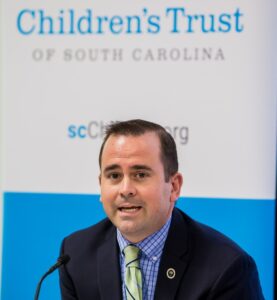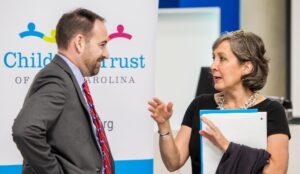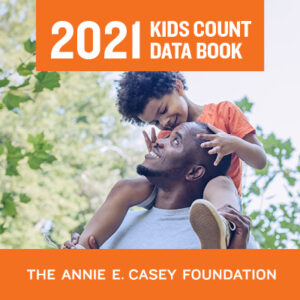South Carolina’s ranking of No. 41 overall in the Annie E. Casey Foundation’s annual KIDS COUNT Data Book on child and family well-being doesn’t come as a shock to state leaders.
But the numbers serve as a jarring reminder of the need to take concrete action that can improve the lives of children and families across South Carolina. The report details where the state ranks in the four domains (PDF): economic well-being (37), education (44), health (46), and family and community (38). Children’s Trust, the S.C. affiliate for the KIDS COUNT project, guided a presentation of the information in the Data Book at a June virtual meeting of the Joint Citizens and Legislative Committee on Children.
CEO Sue Williams moderated a forum that included legislative members of the Committee on Children, Rep. Beth Bernstein (D-Richland), Rep. Neal Collins (R-Pickens), Sen. Katrina Shealy (R-Lexington), Sen. Brad Hutto (D-Orangeburg), and Rep. Mandy Kimmons (R-Dorchester), as well as Michael Leach, state director of the S.C. Department of Social Services and ex officio member of the committee.
Williams noted that South Carolina had slipped from its best-ever ranking of No. 38 in 2018 to the current one and added that neighboring states North Carolina (No. 34) and Georgia (No. 38) are faring better in the annual index of well-being measures. She emphasized the importance of understanding the numbers and following up with policy solutions to the underlying issues.
“When children do well, all of South Carolina will do well,” Williams said. “When we know better, we have to do better. If we’re working together, we can really make a difference.”
Education Starts With Learning to Read
She started the discussion with questions around the education data. The report states that 55 percent of children ages 3-4 are not in school and 68 percent of fourth-graders are not proficient in reading, which is a key to success as children progress to upper-level grades.
“Third grade is an important marker, but it starts a whole lot earlier than that,” Sen. Hutto said. “We need to back it up to kindergarten and even before that. We need to make sure that children are coming in ready to learn.”
David Mathis, Ed.D., a deputy superintendent with the S.C. Department of Education, stressed the importance of that critical period from 4-year-old kindergarten through second grade.

Rep. Neal Collins (file photo)
“You need to learn to read early (in life), and you need to learn to read real well early,” Mathis said.
Rep. Collins noted this year’s state budget includes $34 million to expand 4K in the state. But he also pointed out that parents must take an active interest in their child’s learning.
“How do we engage the families? We need to increase the parental involvement in education,” Collins said.
In the health domain, the lowest ranking for South Carolina at No. 46, several factors were at play. Nearly 10 percent of babies in the state have low birth weight. Kimberly Seals, director of the Bureau of Maternal and Child Health at the S.C. Department of Health and Environmental Control, talked about the importance of monitoring infant mortality, improving maternal health, and supporting prenatal and postnatal care.
Finding Ways to Support a Healthier Population
Rep. Bernstein was asked about instituting federal Medicaid expansion, which was designed to address historically high uninsured rates among low-income adults by providing a coverage option. She noted that South Carolina remains one of 12 states that hasn’t expanded Medicaid at a time when many are losing income and access to health coverage. The Data Book reported 69,000 children in South Carolina without health insurance.

Rep. Beth Bernstein (file photo)
“It’s a travesty that we continue to reject Medicaid expansion in South Carolina,” Bernstein said. “It’s become a partisan issue that should not be a partisan issue.”
The report also shows 36 percent of children or teens ages 10-17 are overweight or obese. Sen. Shealy described her push for healthier school lunches that are available to all children as a way of ensuring they have access to proper nutrition throughout the school year.
In the domains of economic well-being and family and community, the largest hurdle continues to be poverty. Twenty percent of the state’s children live in poverty, and nine percent live in high-poverty areas. That lack of basic needs leads to many problems for families.
Leach pointed to poverty, mental health, addiction, and social injustice as factors that lead to these numbers.
“A lot of these things are related to poverty. These barriers are there, and they’re going to stay if they’re not solved,” Leach said.
Addressing Issues Worsened by the Pandemic

Michael Leach and Sue Williams (file photo)
The annual KIDS COUNT data and rankings represent the most recent information available but do not capture the impact of the COVID-19 pandemic over the past year. The Data Book shows simply returning to a pre-pandemic level of support for children and families would fail to address persistent racial and ethnic disparities. Leach added the problems will persist post-COVID if they are not addressed.
The KIDS COUNT Data Center now features data related to children and families from the federal Household Pulse Survey that measures household experiences during the pandemic. Children’s Trust also published a data snapshot (PDF) that details how families in South Carolina have been negatively affected by the pandemic.
Leach discussed the importance of evidence-based child abuse prevention programs that address family issues on the front end as something that can have a major impact on reducing negative social and health outcomes and lead to a decrease in costs long-term for the state. These various programs support young mothers and their infants, strengthen families through bonding and communications, and promote positive parenting.
Kay Phillips, executive director of the Dorchester Children’s Advocacy Center and a citizen member of the Committee on Children, praised the work of Children’s Trust in addressing and preventing adverse childhood experiences (ACEs), which are traumatic events that occur in a child’s life prior to the age of 18 and can harm a child’s brain and its development. ACEs include emotional, physical, and sexual abuse; domestic violence; substance use; and mental illness of someone in the household.
“As a system, we’re doing a much better job of that now, but we still need to bring about much more awareness,” Phillips said.
Collins emphasized getting the information in the Data Book out to the public in a broader fashion to give everyone a better idea of where South Carolina stands as it relates to the well-being of children and families. He believes it’s important to recognize where you are in order to figure out how to get better.
“We’re making strides, but we’re also behind the eight ball,” he said.

